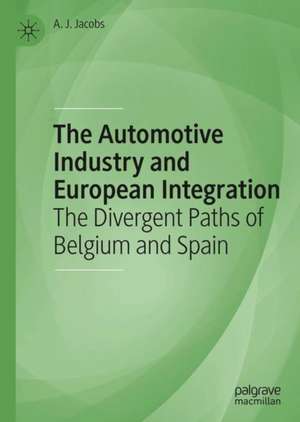The Automotive Industry and European Integration: The Divergent Paths of Belgium and Spain
Autor A. J. Jacobsen Limba Engleză Hardback – 24 aug 2019
| Toate formatele și edițiile | Preț | Express |
|---|---|---|
| Paperback (1) | 475.80 lei 43-57 zile | |
| Springer International Publishing – 25 aug 2020 | 475.80 lei 43-57 zile | |
| Hardback (1) | 650.69 lei 43-57 zile | |
| Springer International Publishing – 24 aug 2019 | 650.69 lei 43-57 zile |
Preț: 650.69 lei
Preț vechi: 765.51 lei
-15% Nou
Puncte Express: 976
Preț estimativ în valută:
124.51€ • 130.33$ • 103.63£
124.51€ • 130.33$ • 103.63£
Carte tipărită la comandă
Livrare economică 31 martie-14 aprilie
Preluare comenzi: 021 569.72.76
Specificații
ISBN-13: 9783030174309
ISBN-10: 3030174301
Pagini: 449
Ilustrații: IX, 452 p.
Dimensiuni: 148 x 210 mm
Greutate: 0.7 kg
Ediția:1st ed. 2019
Editura: Springer International Publishing
Colecția Palgrave Macmillan
Locul publicării:Cham, Switzerland
ISBN-10: 3030174301
Pagini: 449
Ilustrații: IX, 452 p.
Dimensiuni: 148 x 210 mm
Greutate: 0.7 kg
Ediția:1st ed. 2019
Editura: Springer International Publishing
Colecția Palgrave Macmillan
Locul publicării:Cham, Switzerland
Cuprins
1. The Beginnings of the European Union and Overview of the Book.- 2. Car Production and the Four Phases of European Integration, 1958-2017.- 3. Introduction to Part II: The Early Belgian Car Industry.- 4. Ford Motor in Belgium.- 5. General Motors in Belgium.- 6. A History of Renault Haren-Vilvoorde.- 7. The Multiple Roads to VW’s Audi Brussels in Forest.- 8. Volvo and Other Foreign Carmakers in Belgium.- 9. Conclusion to Part II- The Future of the Belgian Car Industry.- 10. Introduction to Part III: The Early Spanish Carmakers.- 11. Ford Motor in Spain.- 12. General Motors in Spain, 1925-2017.- 13. Renault Valladolid and Palencia.- 14. A History of VW’s Spanish Car Plants, Part I: 1940-1989.- 15. A History of VW’s Spanish Car Plants, Part II: 1989-2018.- 16. PSA Peugeot Citroen’s Car Plants in Spain Part I: 1951-1989.- 17. PSA Peugeot-Citroen’s Car Plants in Spain Part II: 1989-2018.- 18. Conclusion to Part III- The Future of the Spanish Car Industry.- 19. EU Expansion, Brexit, and Near-term Prospects for European Car Plants.
Notă biografică
A.J. Jacobs is in the Department of Sociology at East Carolina University, USA. He is author of Automotive FDI in Emerging Europe and The ‘New Domestic’ Automakers in the U.S. and Canada.
Textul de pe ultima copertă
This book chronicles the divergent growth trends in car production in Belgium and Spain. It delves into how European integration, high wages, and the demise of GM and Ford led to plant closings in Belgium. Next, it investigates how lower wages and the expansion strategies of Western European automakers stimulated expansion in the Spanish auto industry. Finally, it offers three alternate scenarios regarding how further EU expansion and Brexit may potentially reshape the geographic footprint of European car production over the next ten years. In sum, this book utilizes history to help expand the knowledge of scholars and policymakers regarding how European integration and Brexit may impact future auto industry investment for all EU nations.
Caracteristici
Offer a comprehensive historical and country-specific comparison of the divergent development trajectories of two Western European nations Presents historically fact-based case studies of the historical development of the auto industry in these countries and analysis of their more recent growth paths Explains the effect that Brexit and further expansion of the EU could have on future trends
